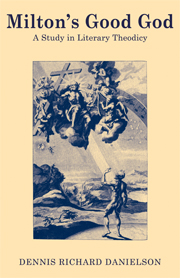Book contents
- Frontmatter
- Contents
- Preface
- 1 The contexts of Milton's theodicy
- 2 God and Chaos
- 3 Assertion and justification: providence and theodicy
- 4 Milton and the Free Will Defense
- 5 Theodicy, free will, and determinism
- 6 Eden and the “soul-making” theodicy
- 7 Paradise Lost and the Unfortunate Fall
- Epilogue
- Appendix: The unfortunate fall of Satan
- Notes
- Selected bibliography
- Index
3 - Assertion and justification: providence and theodicy
Published online by Cambridge University Press: 04 August 2010
- Frontmatter
- Contents
- Preface
- 1 The contexts of Milton's theodicy
- 2 God and Chaos
- 3 Assertion and justification: providence and theodicy
- 4 Milton and the Free Will Defense
- 5 Theodicy, free will, and determinism
- 6 Eden and the “soul-making” theodicy
- 7 Paradise Lost and the Unfortunate Fall
- Epilogue
- Appendix: The unfortunate fall of Satan
- Notes
- Selected bibliography
- Index
Summary
In the last chapter, one of my main concerns was how Christian theology could conceive of creation in such a way as to avoid dualism and retain a high view of divine omnipotence. Moreover, the discussion of theodicy led from creation to redemption – indeed, to a view of redemption as new creation. With that parallel in mind, I would like in this chapter to continue my account of the conceptual context of Milton's theodicy by examining more closely an important, soteriological aspect of the justification of God's ways. Just as Milton produced a cosmogonic model designed to safeguard divine goodness and sovereignty even while actually heightening his readers’ awareness of evil's scope, character, and reality, so, I shall argue, the requirements of theodicy led him toward a soteriological model that aimed at emphasizing the mercy and power of God while retaining that creaturely agency without which evil could scarcely be accounted for in the first place.
So far as the historical context is concerned, I began in Chapter 1 with a few words of Coleridge's on Milton's object and on “the great controversy” of Milton's age, “the origination of evil”; Coleridge immediately continues his pronouncement by remarking: “The Arminians considered it a mere calamity. The Calvinists took away all human will.” Despite his possible oversimplification on this point, Coleridge nevertheless rightly draws attention to the central connection between Milton's great interest in theodicy and the major rift in seventeenth–century Reformed theology.
- Type
- Chapter
- Information
- Milton's Good GodA Study in Literary Theodicy, pp. 58 - 91Publisher: Cambridge University PressPrint publication year: 1982

